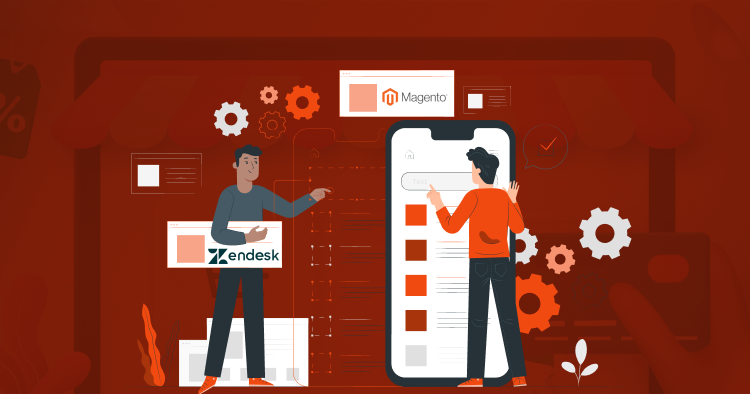Online businesses are flourishing since online shopping trends are booming across the world. However, this massive demand for online shopping has also created almost aggressive competition for eCommerce businesses, making it compulsive for all online merchants to stay ahead with the latest technologies. This is one reason why Magento online stores are shifting to ERP systems.
These ERP systems can collect and manage the data while automating business functions, including sales quotes, production, and accounting. So, if you want to bring all those perks to your business, we will walk you through the entire process and details of Magento ERP integration!
What Is Magento 2 ERP Solution?
ERP systems are basically a suite of multiple apps used to gather, store, and manage business data for interpretation. It can cover multiple business processes and optimize them, such as managing raw material, streamlining the production volume and cash, and keeping control of stocks. It has the capacity to monitor store purchases, payrolls, and orders.
That being said, with the correct use of an ERP system, Magento 2 stores are better placed to handle various business processes and increase sales & revenues.
Magento ERP software are also suitable for businesses that have a hard time taking care of increasing order volume, fulfilling the orders, and satisfying the customers. This is because an ERP system will help with the management of business processes through the utilization of integrated applications.
It can also automate the back-end business functions related to HR, service provision, and tech. For Magento stores, ERP systems will help manage the sales and orders as well.
For instance, the customers can add products to the cart and complete the checkout procedure. Once done, the ERP system will send an automated confirmation email, create a shipping label, and send the tracking email. In addition, it makes the calculations and tells businesses about the profits made from a particular sale.
The data shall always remain well-managed and precise, irrespective of sales processes (these sales processes are constantly tracked and automated through ERPs).
It wouldn’t be wrong to say that enterprise resource planning software can allow companies to manage eCommerce sales through one unified platform. When it comes down to Magento ERP integration, it’s also a viable option for omnichannel marketing, so your business can deliver a consistent user experience.
Read Also Top ERP for Shopify
Why Is Magento Your Perfect ERP Solution?
Ever since Magento ERP integration became a possibility, Magento web development companies are popping up. However, before you sign up for this integration, it’s essential to understand why this ERP integration is a viable solution for Magento shops;
-
Time-Saving
Magento ERP integration will ensure that business data is streamlined across different platforms without compromising the data flow. This integration can implement bidirectional flow because ERP can draw out the data, take orders and payments through Magento, and send the order information to the authorities.
Read Also Shopify SYSPRO Connector
In addition, it will update information about prices, inventory levels, returns, and the status of orders.
-
Enhanced Customer Experience
Magento ERP integration promises data visibility as well as delivery of accurate information. It will eventually help organize daily business activities and monitor the teams. In addition, the ERP solutions will help control inventory, ensure on-time procurement, and share order shipment details. The combination of these three factors will enhance the customer experience.
-
Proper Demand Fluctuation Handling
With online businesses, the product demand keeps fluctuating, and handling them can be challenging. However, Magento ERP integration provides insights into inventory and sales, optimizing customer demand and stock management. In addition, it ensures timely response to fluctuations. For instance, businesses can set up discounts and deals for outdated stock, reducing the chances of financial loss.
-
Robust Customer Support
With the implementation of the Magento ERP system, the Magento store owners will have updated information about customer information and orders so that everything can be tracked. In addition, accurate tracking information ensures that customers’ complaints can be resolved quickly (the integration creates a centralized data store).
-
Reduction In Inventory Costs
The integration allows updated information about sales, and every sale made through the Magento store will appear on the ERP software. As a result, you will be able to plan the store while keeping in mind the current inventory and reduce the chances of repeated business orders. That being said, inventory costs will be diminished, and the software can even update the online sales, ensuring accurate information about stocks.
-
Reduction In Errors
The Magento ERP integration means that every customer and order information will be directly integrated into the business system. This means there won’t be a need to enter the data manually, hence no chances of errors. Not to forget, it frees up time on the employees so that they can work on other valuable tasks.
-
Automated Financial Reports
The Magento stores already allow the business owners to generate financial reports, but the ERP integration helps design in-depth financial reports. For instance, it includes information about balance sheets, cash flows, a trial balance which promises ultimate financial transparency to the Magento businesses.
How Is Magento ERP Good For Automation?
Online businesses are known for their efficient processes; however, manual processes can be time-consuming. In addition, they will be vulnerable to errors and negatively influence the business profitability. With Magento ERP integration, the processing issues will be resolved as it automates the manual and bi-directional processes between different systems.
With the elimination of manual processors, the business owners will be able to process the data, which in turn improves customer experience and overall business efficiency.
With automation, the order management process will be streamlined, and the errors related to data entry will be eliminated. On top of everything, the automation will help adapt the Magento business processes to meet and exceed the strategic goals.
The combination of all these factors will reduce the costs and time related to order fulfillment and shipping. Last but not least, it will reduce the operational costs and improve consistency in the product range.
Read Also Shopify Stripe Integration
What Are The Types Of Magento ERP Integration?
Magento ERP integration is responsible for connecting ERP systems with Magento stores, but there are various types of integrations available, such as;
-
Point-To-Point Integration
With point-to-point integration, the data is transferred from one system to another. This is the most straightforward integration and is suitable for people who have no coding or programming skills.
This integration will only take a few minutes, and there is hardly any need for configuration. It’s an excellent option for startups that are trying to develop and expand the online store’s scope.
-
Custom In-House Integration
This integration depends on the idea of developing an ERP solution for specific clients. For this reason, the integration solution is designed and developed by Magento B2B Extension Development or integration Development Company. This is a time-consuming integration solution and requires extensive effort. However, it does provide access to flexible and advanced tools.
-
Multichannel Integration
Multichannel integration is all about integrating offline and online channels on one point. This integration ensures that there are no incorrect shipping and inventory overselling errors. With this integration, data is collected from offline as well as online sources and combines to create a streamlined and managed store.
Magento ERP Integration Step-By-Step Guide
- The business owners must be aware of the order flow and business processes of the Magento store to ensure everything is set correctly. For this purpose, you need to sturdy different product types, attributes, data, and how everything can be integrated into an ERP platform. In simpler words, you have to think about the workflow of data.
- You need to consider utilizing different inventory management options because they help import different data channels in one place.
- The integration of Magento and ERP should be automated to eliminate the need for manual data entry. In addition, it comes with list generation for optimizing and simplifying the business processes.
- Select the correct interaction method for Magento and ERP integration, such as multichannel, custom-built, and point-to-point integration
Multichannel Magento ERP Integration
When it comes down to multichannel Magento 2 ERP integration, it revolves around integration offline and online channels on one platform. It can collect data from these entities and combine everything to ensure convenient and streamlined flow.
Even more, it helps manage the businesses and offers integration for different processes. For instance, it can work with inventory updates, customer profiles, product prices, product information, and automated customer information management.
Best ERP for Magento
Odoo
This is a well-integrated solution that includes multiple apps for various functions. For instance, it can cover email marketing, HR, accounting, sales, and more. Odoo has unique apps for every category, and all these apps can be synced, promising automation of business processes. As a result, the businesses will reap top-notch benefits and earn profits.
In addition, the users have the option to select specific apps that are relevant to the business need. There is a connector for this integration, so there is no need for manual data entry. It can update information regarding orders, customer information, product prices, shipment, and stocks.
Boost My Shop
This ERP has been specially designed for Magento businesses and has various functions available directly on the control panel. The users can access various features from the Magento dashboard, which means there is no need to install the third-party software. There are three different ERP packages available, such as POS, barcode, and dropshipping. These ERP packages provide basic features, such as supplier management, preparation of orders, and inventory management.
SYSPRO ERP
This ERP is the industry-oriented ERP system that is designed for distributors as well as manufacturers. It includes order management, accounting, scheduling, planning, inventory management, production management, warehouse management, business intelligence, and supply chain management. Even more, it can handle the manufacturing operations, and there is a self-service portal for easier usage. As far as the distribution is concerned, there are hybrid, cloud, and on-premise options available.
Khaos Control
This is an excellent option for people who are looking for an all-in-one solution and has a combination of three products, such as KCC, Window-based app, and browser-based app, and a controlled hybrid that can bring different business mediums. The combination of these apps provides financial tools, stock control, and business management solutions. Also, in addition to Magento, it can be used with eBay and Amazon without any inconvenience.
Infor
This is a cloud-based ERP solution that is designed and hosted by Amazon Web Services. There are five different packages available depending on business goals and sizes. The users can implement different features according to the selected package, such as warehouse management, project lifecycle management, accounting, value-added features, and omnichannel inventory, and more. There are multiple deployment capacities, such as hybrid models, cloud models, and on-premise models. Not to forget, it offers different automation options to ensure efficient and stable workflow.
True ERP
This ERP solution has been around for twenty years and has hundreds of customers. Various features and modules are available to cover different business needs, such as supply chain management and accounting. There is a cross-reference information system that helps with data usability and navigation. With Magento, you can control the transactions and manage them, inventory management, POS, scheduling the manufacturing systems, supply chain management, and warehouse management.
NetSuite ERP
This is a cloud-based ERP and has a modular structure system. In addition to the ERP solution, it offers multi-language and multi-currency support, which is a suitable choice for international businesses. In addition, they have a service team that can help define the needs of the business and customize the modules accordingly. What’s best about this ERP system is that it has pretty convenient integration.
Conclusion
Magento 2 is one of the dominating eCommerce web development platforms powering hundreds of thousands of stores. However, online merchants need to integrate ERP solutions with Magento 2 platform to ensure they remain competitive and grow in a rather hostile competition.
Here in this blog, we have shared everything you need to know about Magento 2 ERP integration, and we are sure you will be ready to integrate one for your store. If you have any further queries or need assistance with Magento 2 ERP integration, you can trust Folio3 for a seamless ERP integration solution with minimum business disruption.
FAQs
1) How Magento Integrates with ERP?
ERP can be connected with Magento to speed up order processing and related business processes. In addition, it can trace different business departments. As far as integration is concerned, you can get in touch with development companies to get Magento integrated with ERP.
2) Is Magento ERP?
Magento is an eCommerce business platform, which means it’s not an ERP system. However, ERP can be integrated with Magento to manage Magento business processes.
3) What is Magento 2 Integration?
Magento 2 integrations are basically third-party services to offer different features, such as product information management, CRM, marketing automation, and ERP. There are other features as well, depending on which integration you install.
4) How Magento integrates with SAP?
Magento can be integrated with SAP through a Magento SAP connector. It is basically a communication medium that syncs the information and updates them on both systems.
5) Is Folio3 a good agency for Magento Integration Services?
Yes, Folio3 is a suitable choice for businesses looking for Magento integration services. This is because we can help Magento stores, irrespective of the industry, with design, development, customization, and migration services. So, whether you are looking for Magento store customization, ERP integration, or even Shopify to Magento Migration, you can trust our experts for a seamless experience. We also offer custom as well as pre-built solutions that help meet your unique business goals.







